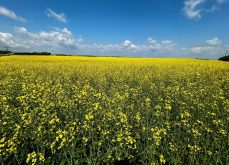A national survey finding no potato wart in any “unregulated” Canadian fields should offer the reassurance on Prince Edward Island potatoes that trading partners such as the U.S. are now looking for, the Canadian Food Inspection Agency says.
CFIA on Thursday reported it has completed this fall’s national survey for the soil-borne fungal potato disease “ahead of schedule.” The survey involves soil testing in areas of Canada that grow seed potatoes, and potato wart “was not detected.”
The survey results come as export certificates remain suspended for fresh P.E.I. potatoes otherwise bound for the U.S., following the confirmation of potato wart in October in two P.E.I. processing potato fields.
Read Also

Dryness poised to threaten Saskatchewan crops
Crops in Saskatchewan are developing in opposite directions, the province’s latest crop report said. Growing conditions in the province vary, with some areas receiving enough rain while other locations are experiencing crop stress due to hot, dry conditions.
Canada said it agreed to temporarily suspend those certificates Nov. 21 at the request of U.S. officials — on threat of a U.S. federal order prohibiting import of fresh potatoes from P.E.I., which CFIA said Thursday would be “very challenging to overturn.”
U.S. Agriculture Secretary Tom Vilsack said Nov. 23 his department would work with CFIA as the Canadian agency “delimit(s) the infestation and trace(s) the sources so that appropriate mitigation measures can be imposed and trade restrictions relaxed.”
The survey’s “expedited completion” is a major step for Canada to reassure international trading partners of the safety of Canadian seed potatoes, CFIA said Thursday.
The United States is also seeking that information in its “ongoing review” of CFIA’s containment and control of potato wart in Canada, the agency added.
Evidence gathered from the survey and forwarded Thursday to the U.S. Department of Agriculture’s Animal and Plant Health Inspection Service (APHIS) “should serve to provide reassurances they need that it is safe to resume the trade of fresh potatoes.”
APHIS, CFIA said, also wants Canada’s current probe into recent detections of potato wart on P.E.I. to show “appropriate mitigation measures and an ongoing monitoring plan for a clearly defined quarantined area.”
APHIS had said last month the detection of potato wart in the two P.E.I. potato fields in October and “a confirmed detection on a separate P.E.I. farm in 2020” indicated the potato wart pathogen “is present in areas not previously known to be infested.”
Data such as the national survey results are a step to assure that trade in potatoes from non-quarantined fields is safe and of no risk to pest-free areas, CFIA said.
“The CFIA stands firm that, based on the science, the risks associated with the transmission of potato wart from fresh potatoes remain negligible when appropriate risk mitigation measures are in place.”
Before the findings in October, potato wart had appeared in 33 fields in P.E.I. since 2000. A plan was put in place in 2001 with the agreement of the U.S. government, allowing exports from lower-risk zones in the province where the fungus hasn’t been detected and where the same equipment wasn’t used.
With P.E.I. potatoes now cut off from the U.S. market, the federal government on Monday announced $28 million to help redistribute now-surplus potatoes to food banks across Canada and dispose of further surplus production. — Glacier FarmMedia Network

















